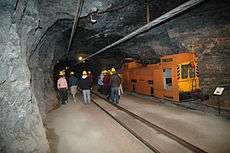Rumelange
| Rumelange Rëmeleng | ||
|---|---|---|
| Commune | ||
 | ||
| ||
|
Map of Luxembourg with Rumelange highlighted in orange, and the canton in dark red | ||
| Coordinates: 49°27′35″N 6°01′50″E / 49.4597°N 6.0306°ECoordinates: 49°27′35″N 6°01′50″E / 49.4597°N 6.0306°E | ||
| Country |
| |
| Canton | Esch-sur-Alzette | |
| Government | ||
| • Mayor | Henri Haine | |
| Area | ||
| • Total | 6.83 km2 (2.64 sq mi) | |
| Area rank | 104 of 105 | |
| Highest elevation | 432 m (1,417 ft) | |
| • Rank | 27th of 105 | |
| Lowest elevation | 287 m (942 ft) | |
| • Rank | 91st of 105 | |
| Population (2014) | ||
| • Total | 5,239 | |
| • Rank | 26th of 105 | |
| • Density | 770/km2 (2,000/sq mi) | |
| • Density rank | 8th of 105 | |
| Time zone | CET (UTC+1) | |
| • Summer (DST) | CEST (UTC+2) | |
| LAU 2 | LU00010012 | |
| Website | rumelange.lu | |
Rumelange (Luxembourgish: Rëmeleng pronounced [ˈʀəməleŋ], German: Rümelingen) is a commune with town status in south-western Luxembourg, on the border with France. As of the February 1, 2011 census, the commune had a population of 5,038.
As of 2008, the town of Rumelange, which lies in the east of the commune, has a population of 4,818.
Rumelange was formed on 25 September 1891, when it was detached from the commune of Kayl. The law forming Rumelange was passed on the 27 June 1891.[1]
It is the site of some of the underground iron mines no longer in operation. Rumelange is home to Luxembourg's National Mining Museum.[2]

Inside the National Mining Museum
References
- ↑ (in French)/(in German) "Mémorial A, 1891, No. 38" (PDF). Service central de législation. Retrieved 2006-08-15.
- ↑ "National Mining Museum". Retrieved 20 February 2011.
External links
-
 Media related to Rumelange at Wikimedia Commons
Media related to Rumelange at Wikimedia Commons
This article is issued from
Wikipedia.
The text is licensed under Creative Commons - Attribution - Sharealike.
Additional terms may apply for the media files.


